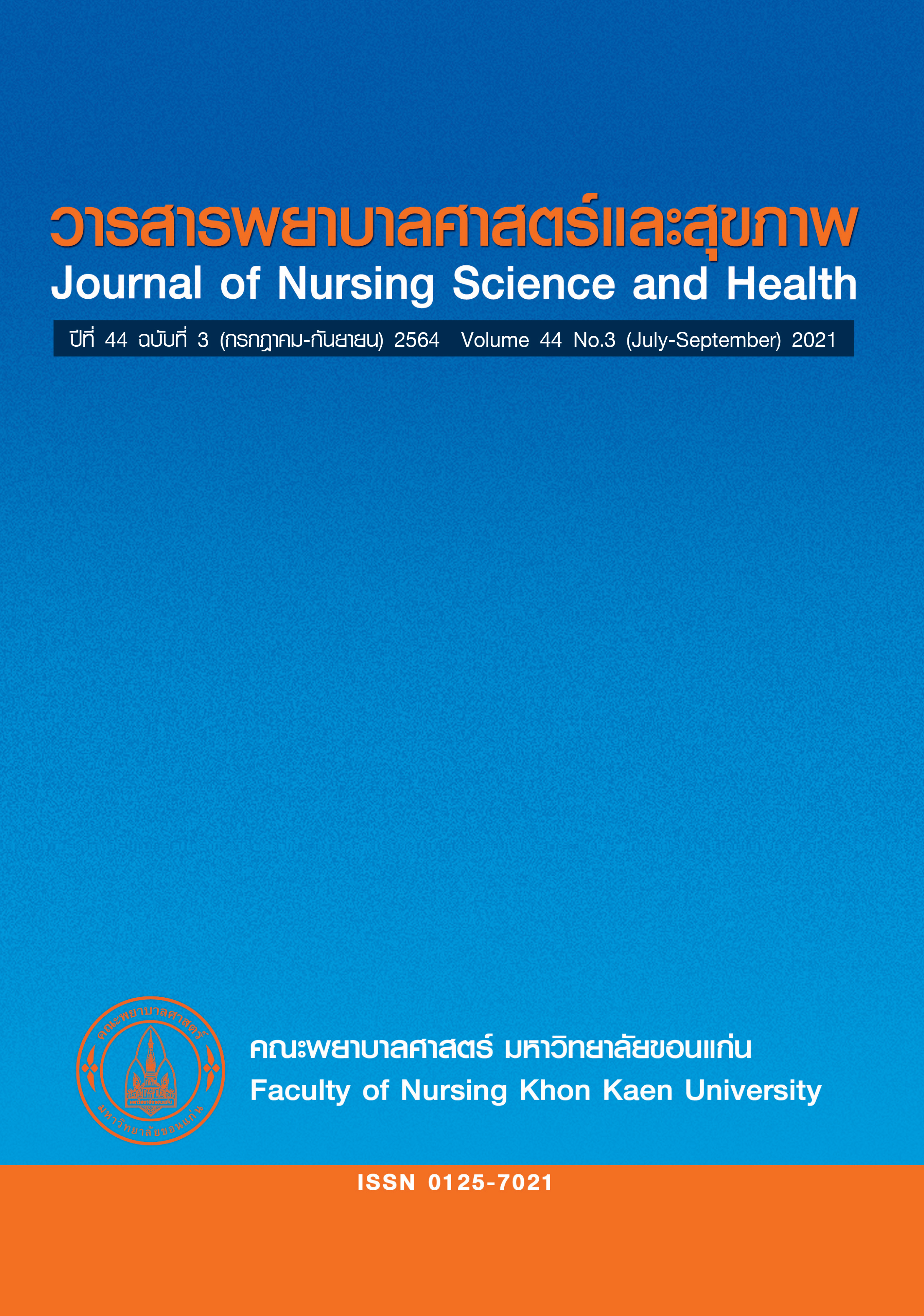ความต้องการข้อมูลในการจำหน่ายของผู้ป่วยที่ได้รับการผ่าตัดก้อนในปอด
คำสำคัญ:
ความต้องการข้อมูลในการจำหน่าย, ผู้ป่วยโรคก้อนในปอด, การผ่าตัดบทคัดย่อ
การศึกษานี้เป็นการวิจัยเชิงพรรณนา มีวัตถุประสงค์เพื่อศึกษาความต้องการข้อมูลในการจำหน่ายของผู้ป่วยที่ได้รับการผ่าตัดก้อนในปอดของโรงพยาบาลมหาราชนครเชียงใหม่ โดยการสุ่มตัวอย่าง แบบเฉพาะเจาะจง กลุ่มตัวอย่าง จำนวน 66 คน เครื่องมือที่ใช้ในการวิจัย ได้แก่ แบบบันทึกข้อมูลส่วนบุคคล แบบสอบถามความต้องการข้อมูลของผู้ป่วยโรคปอดของไฮแลนด์และคณะ ซึ่งแปลย้อนกลับเป็นภาษาไทยโดยทีมผู้วิจัย ด้วยการสัมภาษณ์ผู้ป่วยในวันก่อนจำหน่าย 1 วัน การวิเคราะห์ข้อมูลใช้สถิติเชิงพรรณนา ผลการศึกษาพบว่า กลุ่มตัวอย่างมีความต้องการข้อมูลในการจำหน่ายรายด้าน จำนวน 6 ด้าน โดยเรียงลำดับจากมากที่สุดไปน้อยที่สุด ได้แก่ ด้านการจัดการตนเอง (Mean=1.54, SD=1.25 ) ด้านอาหาร (Mean=1.27, SD=0.60) ด้านความรู้เกี่ยวกับโรค (Mean 0.83, SD=0.86) ด้านความรู้เกี่ยวกับยา (Mean=0.56, SD=0.77) ด้านการออกกำลังกาย (Mean=0.54, SD=0.79) ด้านการสูบบุหรี่ (Mean=0.05, SD=0.23) และมีความต้องการข้อมูลในการจำหน่ายของผู้ป่วยที่ได้รับการผ่าตัดก้อนในปอดโดยรวมอยู่ในระดับน้อย (Mean=3.73, SD=2.76) สำหรับคำถามปลายเปิดพบว่ากลุ่มตัวอย่าง 12 ราย จาก 66 ราย ต้องการข้อมูลมากขึ้นเกี่ยวกับโรคและการรักษา การบอกความจริงเกี่ยวกับระยะเวลาที่จะมีชีวิตอยู่ การป้องกันการกลับ เป็นซ้ำ และการจัดการอาการปวด ข้อเสนอแนะสำหรับการนำไปใช้ แพทย์และพยาบาลควรปรับปรุงการสอนก่อนจำหน่ายแก่ผู้ป่วยและญาติ โดยเพิ่มเติมการให้ข้อมูลเกี่ยวกับอาการหายใจเหนื่อยที่ต้องเรียกรถพยาบาลฉุกเฉิน อาหารที่ควรรับประทาน โรคและการรักษา การบอกความจริงเกี่ยวกับระยะเวลาที่จะมีชีวิตอยู่ การป้องกันการกลับเป็นซ้ำ การจัดการอาการปวด เพื่อให้ผู้ป่วยและญาติมีความเข้าใจที่ชัดเจนยิ่งขึ้น
เอกสารอ้างอิง
Hughes LC, Hodgson NA, Muller P, Robinson LA, McCorkle R. Information needs of elderly postsurgical cancer patients during the transition from hospital to home. J Nurs Schol 2000; 32(1): 25-30. Available from: https://doi.org/10.1111/j.1547-5069.
Pieper B, Sieggreen M, Freeland B, Kulwicki P, Frattaroli M, Sidor D, et al. Discharge information needs of patients after surgery. J Wou Osto Conti Nurs 2006; 33(3): 281-9. quiz 290-1. doi:10.1097/00152192-200605000-00009. PMID:167175 18.
Henderson A, Zernike W. A study of the impact of discharge information for surgical patients. J Adv Nurs 2001; 35(3): 435-41. doi: 10.1046/j.1365-2648.2001.01857.x. PMID: 11489029.
Mesters I, Van den Borne B, De Boer M, Pruyn J. Measuring information needs among cancer patients. Patient Educ Couns 2001; 43(3): 253-62. doi: 10.1016/s0738-3991(00)00166-x. PMID: 11384823.
McWilliams A, Tammemagi MC, Mayo JR, et al. Probability of cancer in pulmonary nodules detected on first screening CT. N Engl J Med 2013; 369: 910-9. doi: 10.1056/NEJMoa 1214726.
Patients care team of General Thoracic Surgery Unit, Faculty of Medicine, Chiang Mai University. Statistics of lung surgery patients and guidelines of care. Chiang Mai: Chiang Mai University; 2014. (in Thai)
Hyland ME, Jones RC, Hanney KE. The lung information needs questionnaire: Development, preliminary validation and findings. Respir Med 2006; 100(10): 1807-16. doi: 10.1016/j.rmed.2006.01.018. Epub 2006 Mar 9. PMID: 16524709.
Boonkerd P, Assantachai P, Senanarong W. Clinical practice guideline for dementia. Guideline for Dementia. Bangkok: Neuroscience Institute; 2003. (in Thai)
Krejcie RV, Morgan DW. Determining sample size for research activities. Educational and Psychological Measurement. 1970; 30: 607-10.
Sawasdepanich N, Thiansawas S. Translation of tools for cross-culture research: Techniques and issues to consider. J Thai Nurs Counc 2011;26(1):19-28. (in Thai)
Nunnally JC. Psychometric Theory. 2nd ed. New York: McGraw‑Hill; 1978: p.244-5.
Reeve JC, Nicol K, Stiller K, McPherson KM, Denehy L. Does physiotherapy reduce the incidence of postoperative complications in patients following pulmonary resection via thoracotomy? a protocol for a randomised controlled trial. J Cardiothorac Surg 2008; 3: 48. doi: 10.1186/1749-8090-3-48. PMID: 18634549; PMCID: PMC2500000.
Memorial Sloan Kettering Cancer Center. After your thoracic surgery. [Internet]. New York: Sloan Kettering Institute [updated 2021 Jan 6; cited 2021 Jun 10]. Available from: https://www.mskcc.org/cancer-care/patient-education/after-your-thoracic-surgery#
Yang J, Zhang Q, Wang X. Role of nutritional support for postoperative recovery of respiratory function in patients with primary lung cancer. Oncol Lett 2018; 16(5): 5978-82. doi:10.3892/ol.2018.9348.
Oswald N, Hardman J, Kerr A. Patients want more information after surgery: A prospective audit of satisfaction with perioperative information in lung cancer surgery. J Cardiothorac Surg 2018; 13: 18. https://doi.org/10.1186/s13019-018-0707-8.
Glans M, Kragh Ekstam A, Jakobsson U. Risk factors for hospital readmission in older adults within 30 days of discharge–a comparative retrospective study. BMC Geriatr 2020; 20: 467. Available from: https://doi.org/10.1186/s12877-020-01867-3.
ดาวน์โหลด
เผยแพร่แล้ว
รูปแบบการอ้างอิง
ฉบับ
ประเภทบทความ
สัญญาอนุญาต
วารสารพยาบาลศาสตร์และสุขภาพเป็นเจ้าของลิขสิทธิ์ในการเผยแพร่ผลงานที่ตีพิมพ์ห้ามผู้ใดนำบทความที่ได้รับการตีพิมพ์ในวารสารพยาบาลศาสตร์และสุขภาพไปเผยแพร่ในลักษณะต่าง ๆ ดังนี้ การนำบทความไปเผยแพร่ออนไลน์ การถ่ายเอกสารบทความเพื่อกิจกรรมที่ไม่ใช่การเรียนการสอน การส่งบทความไปตีพิมพ์เผยแพร่ที่อื่น ยกเว้นเสียแต่ได้รับอนุญาตจากวารสารพยาบาลศาสตร์และสุขภาพ



